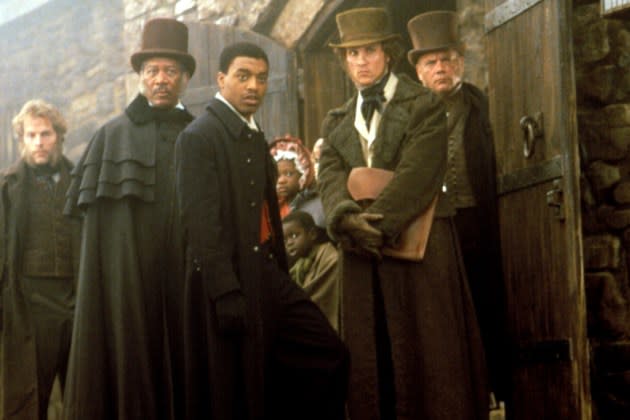‘Amistad’: THR’s 1997 Review

On Dec. 4, 1997, Steven Spielberg unveiled historical drama Amistad at its premiere in Washington, D.C. The film went on to gross $44 million and nab four Oscar nominations at the 70th Academy Awards, including for cinematography, score, costume design and supporting actor for Anthony Hopkins’ role. The Hollywood Reporter’s original review is below:
DreamWorks SKG’s Amistad is a holiday feast: Namely it is an ambitious story layout teeming with historical significance, packed with a sterling-set cast and dished up with the finest technical crockery. But like most holiday tables, after everything gets passed around for the first time, nothing much goes together.
More from The Hollywood Reporter
Alas, this personal/legalistic story about 53 Africans who broke free of their shackles while aboard the Spanish slave ship La Amistad keeps afloat mainly on its kind-spirited intentions rather than the narrative craftsmanship of the vessel itself.
Directed by Steven Spielberg, this DreamWorks presentation in association with HBO is certain to win some end-of-year honors. In fact, slot it as a Golden Globe nominee in the dramatic category (in last year’s Evita slot). Generically and aesthetically, however, Amistad seems more akin to some of the fine HBO films of the past several years (the political/social John Frankenheimer films, in particular). Were it sailing under the HBO banner exclusively, it would certainly win a slew of CableACE honors.
On the boxoffice horizon, Amistad should navigate best on select-site waters and will likely win a significant black audience for its initial sails, but word-of-mouth will capsize this talky and surprisingly tedious history lesson.
With Spielberg at the helm, Amistad starts out with raging power as the African slaves break free of their shackles and conquer their oppressors. One recalls the ominous terrors of an early David Lean film in these initial, emotionpacked moments. Here, Spielberg does his hero, Lean, proud.
Unfortunately, the film’s initial visceral and intellectual promise soon tacks off course after the slave-sailed ship is captured by the U.S. Navy.
Still, Amistad charts an ambitious course as moral/philosophical/political issues are debated and confronted: Who has jurisdiction over the Africans, since Spain claims they are its “property?” And, most importantly for the United States, should they be freed, since at that time (1839) slave transport was illegal?
Well, prepare to take notes on a veritable survey course on navigational and constitutional law. Most woefully, this important section is written in a style most akin to the lectures of an assistant professor of history: One’s mind drifts and then settles back on the eloquent clarity of Robert Bolf’s A Man for All Seasons in which important questions of church and state were delineated in the most moving and concise manner. No such eloquence, no such emotion here in David Franzoni’s painstakingly pallid script.
Amistad, despite its powerful subject matter, is most vexingly long on philosophical wind but disappointingly short on human emotion. A Spielberg movie short on human emotion? Are you nuts? Steven Spielberg can milk tender feelings out of the most generic commercial vehicle, and slavery is a subject matter that should fibrillate your heart into its most convulsive sympathies.
Despite its good intentions, Amistad also does not do justice to the African captives who endured this horrible hardship. Perhaps that is a flaw inherent in the story structure. Throughout, except for the uprising leader Cinque (Djimon Hounsou), the African prisoners are presented only as a noble mass, sitting solemnly in the docket or being led back to their cells. They are not sufficiently personalized and their anguish and agony is never properly prismed to an individual level we should be crying, but we’re only looking at our watch, waiting for the class to be over.
Laboriously, Amistad sinks to courtroom histrionics and showy, historical name-dropping. Through it all, we finally learn that this case is of particular national significance. It will surely trigger the loss of the South to President Martin Van Buren’s reelection plans should the Africans not be convicted of murder.
There is no denying the significance nor the importance of this story; there is only disappointment in the numbing, muttonchopped narrative. Most gratingly, there’s a transparently manipulative scene involving an African violet that Spielberg milks as a visual correlative to connect the two cultures that of the United States and that of the entire continent of Africa. We would pay quadruple admission in Brooklyn to sit near Spike Lee when this scene pops up.
Despite its unfortunate short comings, Amistad is a veritable flagship on the acting front. Morgan Freeman’s quiet, stirring power as an abolitionist could win him a best supporting actor nomination. Similarly, Anthony Hopkins has never been better. Playing former President John Quincy Adams (regarded as the brightest president in U.S. history), Hopkins’ performance is a joy of crusty brilliance and moral tenacity. As the African leader, Hounsou brings a perfect blend of courage and honor to his role. Matthew McConaughey is once again captivating in his role as an upstart attorney who takes on the Africans’ case, but then he’s had practice with this type of pro-bono performery before in A Time to Kill.
Technically, Amistad is a marvel of craftsmanship, owing to the precise period design of Rick Carter, the astute costumery of Ruth Carter and the articulate cinematography of Janusz Kaminski. Ultimately, Amistad sinks to mere cannon fodder in a showy denouement as U.S. naval vessels shellac a slave-holding, Mediterranean prison that is only cursorily referred to in the movie. Admittedly, it’s one helluva cathartic bombardment, the kind we love to see in a Joel Silver action movie. — Duane Byrge, originally published on Dec. 1, 1997.
Best of The Hollywood Reporter

 Yahoo News
Yahoo News 